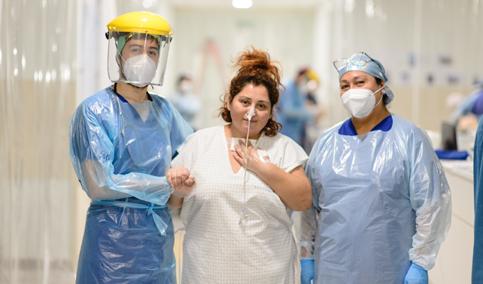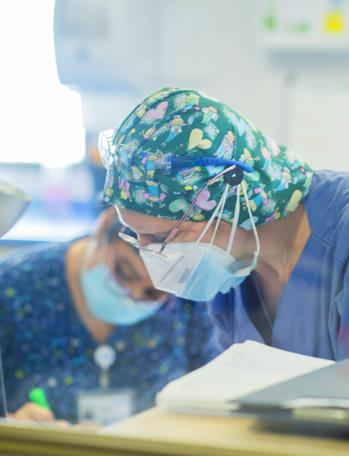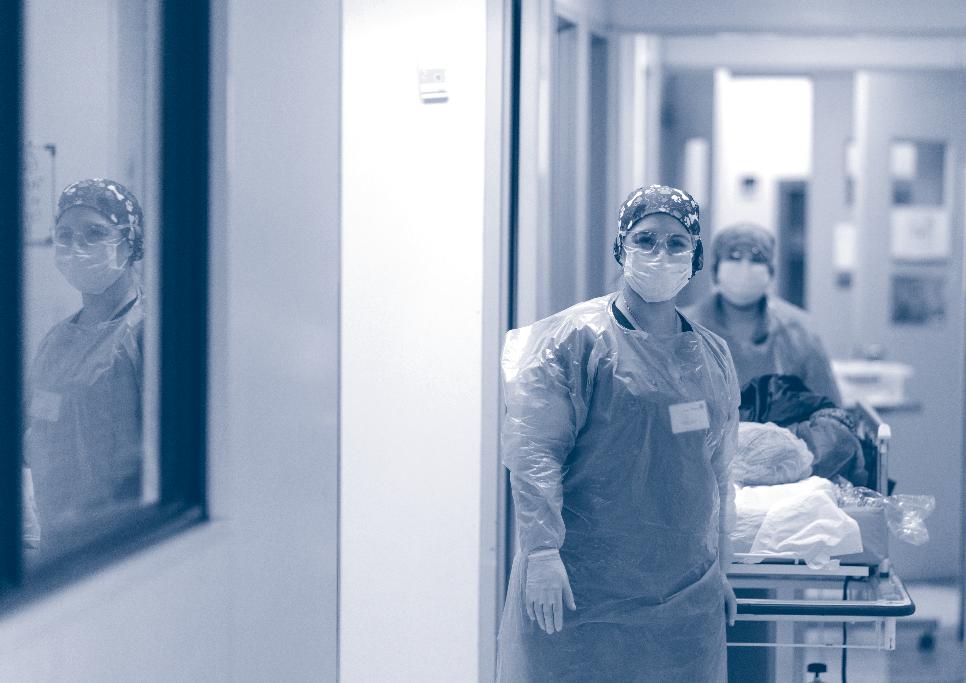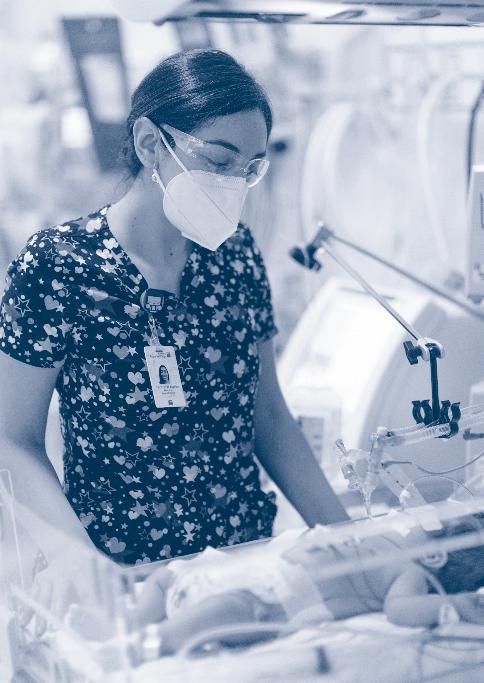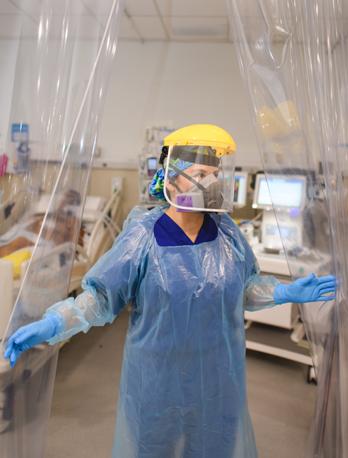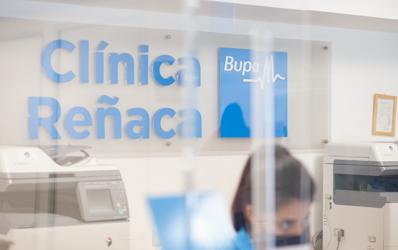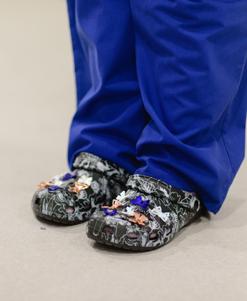
6 minute read
We transform our capability to help others
I am so lucky to work for this company! We had so many people supporting us. All you had to do was pick up the phone and say: I need masks, more beds, people to look after the children, and our people would come to work willingly.

We had to abandon our customary personal touch with patients. Where we knew the person wasn’t going to recover and was going to die soon, we would call the family in to say goodbye, but it was all very cold. We only let them have twenty minutes, and didn’t let them get too close. But we tried to make up for that with the miracle of technology. We used everything constantly: phones and tablets that the company provided. A lot of farewells were said that way and you felt like you were invading what ought to have been a very private time. I remember the good moments, of which there were many. We watched lots of patients recover, people who went out stronger and who helped us keep going ourselves. My family were hugely supportive. I am married, with three children aged 17, 15 and 13 years old. My husband is asthmatic and I was really afraid of passing it to him. I can’t thank him enough for how easy he made it all for me. The first weeks, he worked from home, which helped me be able to be very flexible, and he didn’t let me lift a finger at home. I would open my front door and go straight to my room. The next day, I would have a shower and go back. That was my family relationships for the first two or three weeks – non-existent, basically. My husband would say: Forget the house - I will deal with that, you deal with the hospital. That helped me to be with my team, who were very overworked. I tried to lighten their load and doing analyses and dealing with the deceased so that they didn’t have to deal with the corpse of someone they had got close to. We were more afraid of the future than the present. There were times when we couldn’t see any light at the end of the tunnel, but after four weeks of lockdown in Spain we started to see a small shaft of light. Where there had been 100 Covid patients waiting to be admitted, it was down to twenty. I think Covid gave me back the chance to be on the front line with my patients. Before that, I sometimes wondered why I had studied nursing if I was going to end up in administration. I should have studied business administration, as all I did was project planning, human relations, but no nursing. But after all we have been through I can only say: How lucky I am to have studied nursing! The most difficult part is behind us and is actually the most gratifying part of my ten years as nursing director. It is really special when your staff tell you that they have felt supported and that they knew they were not alone in the crisis. �
Mama, when is this going to end?
esther ulloa Nurse Bupa Reñaca Hospital
«In the paediatric intensive care unit we have had the challenge of looking after adult patients. Even now, we have a smaller number of children, and we still work as a high dependancy unit for adults. I am a mother to twins of 4 years old. As well as the extra shifts due to the pandemic over the past few months, the schools have been closed and I had the added stress of being a teacher to my children. It has been really hard for them. Their friends are in the flat below and they haven’t been able to play with them. They ask me: When is this going to end? When is the coronavirus going away? I sometimes worry that I’ll run out of ideas to entertain them. Until we get the vaccine, we will keep on living this half-life».
REÑACA — CHILE

Facing the crisis as a team
betsy moraga Nurse Clinical Service

SANTIAGO — CHILE
One thing we have really done well is teamwork. If it wasn’t for the commitment and effort from all the nurses, technicians, paramedics and the management team, we could never have risen to the challenge.
The pandemic has been a difficult situation for us. Everything is different in peoples’ homes. A nurse goes to a patient at home and they are often chronically ill and surrounded by their family. Our service has to go into a home where there are no hospital facilities and we have to give them medical care in that context. If there are any problems, you have to use your initiative, because you don’t have a doctor beside you who you can ask what to do.
Our service is different from others. We care for people in their homes. We have all types of patients – some are very sick, others less so. We have built a national network, though the biggest area is in Santiago. We go to Antofagasta, La Serena, Viña del Mar, Puerto Montt, Concepción and Temuco, all with the same working model.
One of the most difficult things has been having resources to meet the demand. We received around 8 to 10 patients per day to free up hospital beds and to care for them in their homes.
I know that the commitment of the team has kept us going and helped us work well and be cheerful and enthusiastic. We have formed a really good loyal network and and we are stronger because of it. �

I enjoyed learning a new role during the pandemic
paulina roa Midwife Bupa Santiago Hospital
Before this, I worked as an emergency midwife in the same clinic. In June, I was asked to take on a new position to help with the pandemic. I was just coming to the end of my maternity leave at home. My baby girl is 8 months and I have another girl of 4 years old. I had the right to continue with my leave, but when I received the call asking to take the helm and to be a resident midwife, I said: Yes, let’s do this, I accept the challenge. It is a challenge, mainly because being a lead midwife can be more difficult, and because there were some new procedures. But it was a really rewarding role, and I was able to rub shoulders with different leaders in different services. It was a great atmosphere, in spite of the situation we were going through. My work was to manage the beds across the clinic, as well as staffing, and you get an overall perspective and do a bit of everything in the clinic. You are in charge. It is hard work, because you are in charge of planning and you have to help deal with any problems as they arise in any of the areas. What we do as residents is receive all the teams, go through each service looking at staffing, beds, whether there are going to be any potential problems and such. You become like a mother in the company. One of the most difficult things I had to contend with was that when a patient died of Covid, the resident had to be an eye-witness. You had to console the families, many of whom had not seen the person before they died. It was the last chance to do your bit for them at such a difficult time.

